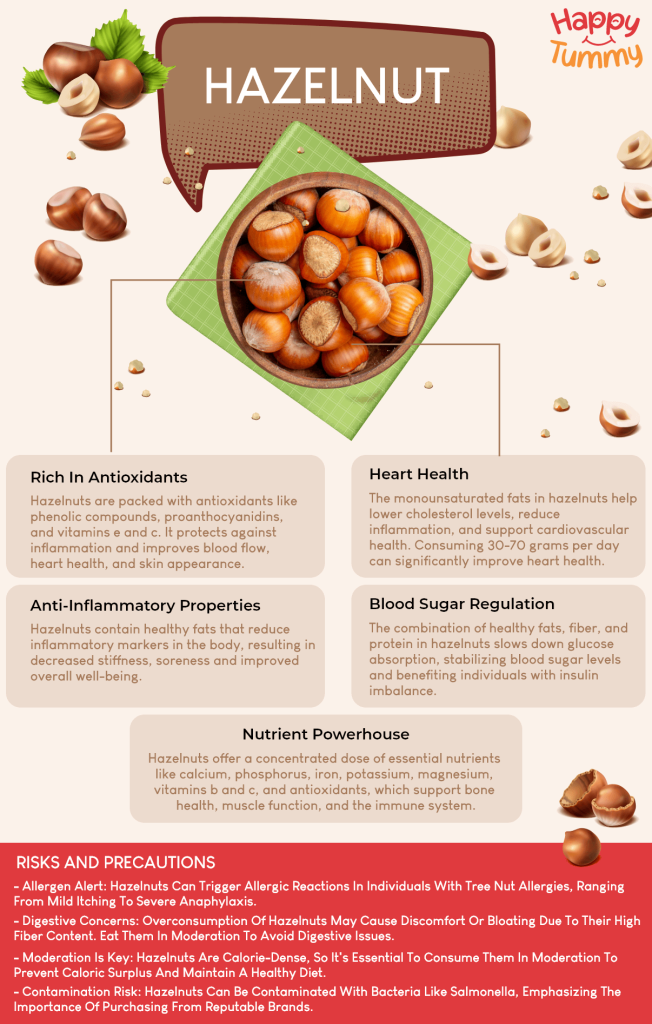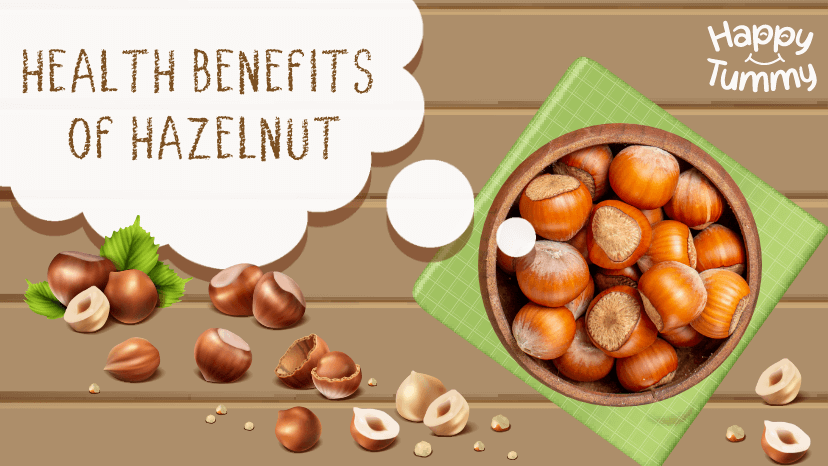Table of Contents
In the hustle and bustle of modern India, grabbing a quick samosa or pakora seems like the easiest way to satisfy those afternoon hunger pangs. However, not only does it call our long-term health on the gallows, but it adds to our weight. Utter disaster! And the solution? Hazelnuts!
Hazelnuts might be new to your vocab, but these tiny treats are so savoury and salubrious that you might need a pal to stop your indulgence. And the hazelnut benefits? Sheer brilliance.
These tiny treasures, often enjoyed in chocolates and pastries, are packed with a surprising punch of health benefits. They can keep you energized, manage your blood sugar, strengthen your bones, and even make you smile. What more does one need?
To carry their goodness to you, we’ll crack open the many hazelnut benefits, let you taste their richness, tell you some really good recipes, and some risks and precautions to take care of. Let’s go!
Know Your Hazelnuts – History, Names, and Nutrition
Are hazelnuts of Indian origin? No! But we Indians have a habit of including everything healthy in our diets. So, where have hazelnuts come from, if not India?
Researchers, according to the oldest evidence found, put their guess on Scotland. Their time machine goes back some 8,000 years. Today, it is mainly cultivated in Turkey, Italy, Spain and the US.
Cultivation of Hazelnuts in India is still nascent. A few places in Himachal are cultivating it and call these nuts ‘Thangi’. However, you may easily find it online.
In ancient Rome, hazelnut branches were used as torches during wedding ceremonies.
But why should you eat hazelnuts? One big reason – their rich nutritional profile. Let’s have a look.
Hazelnuts– nutritional value – 100 grams [1]
| Energy | 628 kcal |
| Protein | 15 grams |
| Fat | 60.8 grams |
| Carbs | 16.7 grams |
| Fibre | 9.7 grams |
| Minerals | Calcium, Phosphorus, Iron, Potassium, Magnesium, Sodium, Zinc, Selenium, Copper, Manganese, etc. |
| Vitamins and other plant compounds | Vitamin C, B, Folate, Choline, Vitamin E, K, Carotene, Lutein, Zeaxanthin, etc. |
A mere glimpse of the table lauds us about the sheer brilliance this nut is. But what does it taste like?
About Taste – Hazelnuts, when tasted, give some sweet notes, filled with warmth, and seasoned with a slightly buttery flavour. When eaten raw, they seem slightly chewy. If you like them crunchy, give them a little roast and you are good to go.
Hazelnut is often called by numerous other names such as:
- Cobnuts
- Filberts
- Desert Nuts
- Thangi (ठांगी)
No matter what its name is, it never disappoints in terms of its benefits. So, let’s now look at some amazing hazelnut benefits and see why we must embrace their richness.
Hazelnut Benefits – A Perfect Punch of Health and Taste

Let’s first start with the fact that anything good for us can turn toxic if consumed without caution and limits. Similarly, hazelnuts must also be consumed in moderation to cherish their goodness.
Now, here are some proven hazelnut benefits that vouch for its health-enhancing potential:
1. Contains a wealth of antioxidants
The first thing that any nut or seed gets recommended is because of their antioxidative properties. Hazelnut is one such nut that stays rich in antioxidants.
Hazelnuts contain a variety of antioxidants, including:
- Phenolic compounds (gallic acid, p-hydroxybenzoic acid, epicatechin, caffeic acid, sinapic acid, quercetin)
- Proanthocyanidins
- Vitamin E
- Manganese
- Carotene
- Lutein + Zeaxanthin [2]
And the list goes on. But what do these scientific names mean to you?
- Phenolic compounds mean you will experience reduced puffiness and inflammation. You will feel more energized due to potentially improved blood flow.
- Proanthocyanidins will help you maintain a healthy cell environment. Consequently, you’ll keep certain diseases out of your health report.
- Vitamin E, as we all know, shields our cells from damage. This means fewer aches and pains, and a more youthful appearance.
- Manganese means stronger bones and faster wound healing. Dream of an active lifestyle with quicker recovery times.
- Carotene results in sharper vision, especially in low-light conditions. Wow! It could allow you to enjoy activities like reading or driving at night with more ease.
- Lutein + Zeaxanthin? Again, beneficial for the eyes. These duos protect eyes from age-related macular degeneration, thereby helping maintain clear vision for longer.
Furthermore, you get better heart health, reduced cholesterol, improved skin, better brain functioning, and whatnot!
All of this for what? For snacking that is delicious and healthy.
Unlike most flowering plants, hazelnut trees bloom in the winter!
2 – Healer of the hearts
This one is quite literal. Hazelnut benefits our hearts. This small nut contains compounds that protect our hearts from several issues.
- One study concluded that hazelnuts helped in lowering blood cholesterol by being a good source of monounsaturated fatty acid, tocopherols, squalene, etc. [3]
This is due to the fact that mono and polyunsaturated fats are good fats. These fats help our bodies get rid of bad cholesterol, which blocks our blood vessels.
A group of 21 people, who consumed hazelnuts for a month, found that it lowered their cholesterol and triglycerides. [4]
This same positive effect was even shown in a review of 9 studies done over 400 people too. [5]
Hazelnuts are also packed with nutrients like fibre, potassium, and magnesium. These nutrients contribute to keeping your blood pressure in a healthy range. Imagine feeling less stressed throughout the day, with more energy for activities you enjoy. But how much to eat to get these desired hazelnut benefits? [6]
Eating 30-70 grams of hazelnuts per day can help you have good heart health. [7]
3. Reduces inflammation
Ever feel achy after a workout? Or sluggish for no reason? Inflammation might be the bad guy behind it. But the good news is, hazelnuts can be your shield against it!
Hazelnuts are packed with healthy fats. Research suggests that these fats can help reduce inflammatory markers in your body. Imagine feeling less stiffness and more bounce in your step. [8]
Studies have shown that people who ate hazelnuts into their diet experienced:
- Reduced inflammation due to reduction in high cholesterol levels after eating 60 grams of hazelnuts per day for twelve weeks straight [9]
- Improved overall well-being in healthy adults after consuming 40 grams per day. [10]
For us, reduced inflammation in the body means no more stiffness and soreness in the body, reduced post-workout muscle stiffness, more flexibility, and improved organ health. In short – a long merry life.
While hazelnuts are a powerful tool, remember a balanced, calorie-controlled diet is crucial for managing inflammation in the long run
4. Buddha to your blood sugar
Sugar is not so sweet when it comes to our health. But when we speak of blood sugar, we speak of a different sort of sugar (not white or table sugar). The sugar we are referring to is a simple sugar called glucose, which acts as the primary fuel source for our cells. However, simple sugars, in excess, are too bad for our bodies to handle.
Hazelnuts are packed with a winning trio –
- healthy fats,
- fibre,
- and protein.
This fantastic trio slows down how your body absorbs sugar from your food. Studies back this up too.
- Research shows that people who include hazelnuts in their diet tend to experience steadier blood sugar levels.
- Also, hazelnut benefits people with insulin imbalance through its oleic acid content. [11]
Plus, hazelnuts are a low glycemic index (GI) food. This means they don’t cause those dramatic blood sugar spikes.
5. Soaked in nutritious compounds
Hazelnuts aren’t just a delicious snack – they’re a nutritional powerhouse packed with everything your body needs to thrive. These nuts offer a concentrated dose of nutrients for sustained energy.
Thinking of calories? You get a whopping good 628 calories per 100 grams. Thinking of protein, fat, and fibre? You get plenty, and that too good quality that actually helps our bodies. The fat that hazelnuts contain is unsaturated fat, which has been proven again and again to be super beneficial for our heart and overall well-being. [12]
Now, in terms of micronutrients, this nut is a gem. We get everything from calcium, phosphorus, iron, potassium, magnesium, vitamins C, and B, to folate and numerous other antioxidants and plant compounds. The list knows no cease. [13]
Here is a glimpse of what these nutrients mean for our well-being:
- Calcium and Phosphorus act as building blocks of strong bones and teeth. This keeps our frame sturdy and our smile bright
- Iron carries oxygen throughout your body. This ensures we feel energized and ready to tackle the exhausting workday
- Potassium helps regulate blood pressure and aid in proper muscle function. It is a beautiful combo for a healthy heart and a body that moves with ease
- Magnesium supports hundreds of bodily functions, from supporting muscle and nerve function to aiding a restful sleep
- Vitamin C, as we all know, supports our immune system. It was much sought during the frightening COVID days
- B Vitamins allow for energy production, brain function, and a healthy metabolism. Consequently, we stay sharp and well-fueled.
Does not this nut seem like a gift from god?
The uses for hazelnuts extend beyond the kitchen. Hazelnut oil, extracted from the nut kernels, is used in cosmetics and some food products.
6. Delicious and easily incorporable
Hazelnuts might seem like an exotic ingredient, but trust us, they can seamlessly integrate into your favourite Indian dishes! You can make countless dishes using one super-delicious ingredient – hazelnuts.
Love drinking beverages? Blend it into your favourite smoothie or grind it into your lip-smacking shake. It will never disappoint.
Love snacking? Give them a little roast, sprinkle your favourite herbs and spices, and there you have it – a snack that you’ll never get enough of. Just keep in mind not to overindulge.
Love baking? Put them in over, peel their skin off, turn it into flour, and add to your baking mix. Your baked foods will sing an enhanced symphony.
Or are you looking for something more delicious and yet more healthy? Roast them, coat them with cocoa, sprinkle some crushed dry fruits, and cherish them. The list is never-ending. Looking for more?
Hazelnut recipes that will make you love a healthy lifestyle:
- Hazelnut & Date Energy Bars – Whip up a batch of homemade energy bars packed with protein, fibre, and natural sweetness from hazelnuts and dates for a healthy and satisfying on-the-go snack.
- Creamy Korma with Hazelnuts – Love Korma? Here is a twist you’ll love more. Take your favourite korma recipe and add chopped hazelnuts. Their rich, nutty flavour and delightful crunch will create a unique taste sensation that will complement the creamy sauce perfectly. Mmm!
- Hazelnut & Berry Yogurt Parfait – Layer creamy yoghurt with chopped hazelnuts, fresh berries, and a drizzle of honey. This will bless you with a refreshing and nutritious breakfast that’s ready in minutes.
- Roasted Hazelnuts & Dried Fruit Mix – Ditch the processed snacks. Pick a handful of roasted hazelnuts and pair them with dried fruits like raisins or cranberries. This mix is so satisfying that you’ll not resist seeing your bowl empty ever. And what will you get? A perfect balance of protein, fibre, and antioxidants.
- Hazelnut Crusted Kheer – India can never be spelt without k-h-e-e-r. It is a must-have dish. And with hazelnut, you can elevate it to the next level. Add a delightful textural contrast with a hazelnut crust. Simply crush roasted hazelnuts and sprinkle them on top of your prepared kheer for a touch of nutty flavour and a beautiful presentation.
Benefits of Hazelnut for Men and Women
| Benefit | How it Supports Men | How it Supports Women |
| Heart Health | Lowers bad cholesterol (LDL) and improves blood flow, reducing risk of heart disease. | Lowers bad cholesterol, regulates blood pressure, potentially reducing risk of heart disease during pregnancy. |
| Reproductive Health | Improves sperm quality and motility, potentially enhancing fertility. | Good source of nutrients that may improve ovulation regularity and egg quality (preliminary research). |
| Bone Health | Rich in minerals like manganese and copper, which contribute to bone strength and density. | Excellent source of calcium, magnesium, and phosphorus, essential for strong bones, specially during pregnancy and menopause. |
| Weight Management | High in fibre and healthy fats, promoting feelings of fullness and potentially aiding weight management efforts. | High in fibre and healthy fats, promoting satiety and potentially aiding weight management goals. |
| Blood Sugar Control | May help regulate blood sugar levels due to fibre content and healthy fats. | May help regulate blood sugar levels during pregnancy and reduce risk of gestational diabetes. |
| Cognitive Function | Rich in vitamin E and antioxidants, potentially protecting brain cells and cognitive function. | Rich in vitamin E and antioxidants, potentially protecting brain cells and cognitive function, especially during pregnancy and aging. |
| Healthy Skin | Vitamin E and healthy fats contribute to skin health and may reduce signs of aging. | Vitamin E and healthy fats contribute to skin health and may reduce signs of aging. |
Alright! We now have seen the true potential of this nut by seeing these many hazelnut benefits. And you might feel like ordering it right now. But wait! Before you do, take care of these risks and precautions to keep a safe margin.
Hazelnuts – Risks and Precautions
Although nuts and seeds usually come with a tag of ‘super healthy’, there always remain a few risks. Knowing these will only enhance their benefits. Here are some risks and precautions involved with hazelnuts:
- Allergen
- Digestion
- Moderation
- Contamination
Remember that hazelnuts, like other nuts, can afflict common tree nut allergy. If you have allergies to peanuts, walnuts, or other tree nuts, it’s best to observe yourself. Symptoms of a hazelnut allergy can range from mild (itching, hives) to severe (anaphylaxis).
Although hazelnut benefits through its fibre content, more of it can hurt your digestion. It may give you some discomfort or bloating. So, always eat in moderation. Also, eating them in moderation will ensure that you are not going into a caloric surplus. This is because hazelnuts stay loaded in calories – 628 in 100 grams.
At last, hazelnuts can be contaminated with bacteria like Salmonella. It is always best to buy from reputed brands.
If you have a personalized dietician for yourself, always consult before making your dietary choice.
Conclusion
Samosas and pakoras might be a tempting snacking option, but only when you don’t know about hazelnuts. This tiny nutty beauty stays soaked in nutrition. It offers not just numerous health benefits but also a delicious punch of flavour. From managing blood sugar to keeping your heart happy, reducing inflammation, blessing with antioxidants, and even enhancing your recipes, it offers everything.
So, go forth and explore the world of hazelnuts! Blend them into smoothies, sprinkle them on kheer, or indulge in homemade energy bars. But as you do this, remember that moderation is key. With a little planning and creativity, you can incorporate hazelnuts into your favourite Indian dishes and transform them into delicious and nutritious treats.
Now that you’re armed with the knowledge of hazelnut benefits, risks, and precautions, what are you waiting for? Go forth and conquer your health goals – one delicious hazelnut at a time!
FAQs
Hazelnuts are generally safe for most people and offer numerous health benefits. However, individuals with nut allergies should avoid them altogether to prevent allergic reactions. Additionally, due to their high-fat content, overconsumption of hazelnuts may lead to digestive issues such as gas, or diarrhea.
Hazelnuts can be enjoyed at any time of the day, making them a versatile snack option. They make for a nutritious addition to breakfast, whether sprinkled on oatmeal or yoghurt, or blended into a smoothie. Snack on a handful of hazelnuts between meals to keep hunger at bay, or incorporate them into salads, baked goods, or savory dishes for added flavor and texture.
Yes, hazelnuts can be eaten directly as a snack or added to various dishes without any additional preparation. Simply crack open the shell to reveal the nut inside and enjoy it. You can purchase shelled hazelnuts as well, which are readily available.
Yes, it is perfectly safe to eat the skin of hazelnuts, and doing so can provide additional nutrients and fibre. The skin of hazelnuts contains antioxidants and other beneficial compounds that contribute to their health-promoting properties.















